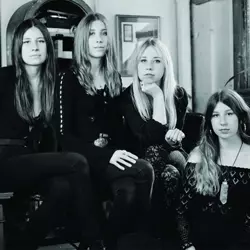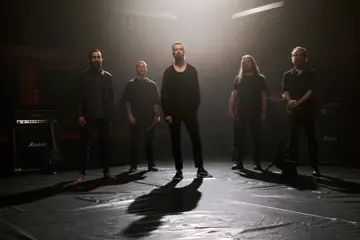 Stonefield
StonefieldIn the three years since the Findlay sisters (singer and drummer Amy, guitarist Hannah, keyboards player Sarah and bass player Holly) became 2010 triple j Unearthed High winners as Stonefield, they've cut a debut EP, Through The Clover, with producer Greg Wales, a double A-side single, Blackwater Rising/Yes Master, with producer Scott Horscroft, and a six-track mini album, Bad Reality, with Lindsay Gravina – three fine Australian producers. For their debut album, however, the girls have opted for Englishman Ian Davenport, the house engineer/producer at Courtyard Studios in Oxford. His CV includes producing, engineering or both for acts as diverse as Supergrass, Chris Difford, The Duke Spirit and Brighton, UK-based alternative rock three-piece Band Of Skulls, and it was his work with that last band that tipped the girls in his favour.
“We absolutely love both the Band Of Skulls albums that he's done,” Amy Findlay admits, on the line from Sing Sing Studios in Cremorne, Melbourne, where Stonefield are cutting their debut album. “[We love] the sonics, and just think that it's this really nice combination of that old-school warm sounds but it's kind of something new as well. We spoke to quite a lot of producers to suss out their vibe and see how they work and I guess it's like a lot of things with the music industry, it's about going with your instincts. Chatting to him via Skype, we had this really good feeling about him and he totally understands what we want to do with this – I think we made a very good decision; it's going really well.
“I think he's capturing the rawness and the energy of the band. He's all about getting great sounds and then just capturing the moment, so I guess it's more real than past experiences where we just get caught up in layering sounds and making it sound all big, so that there's not that rawness there. We've been doing everything together live, just to capture that vibe, and then basically taking whatever we can from it.”
Stonefield have been recording in Sing Sing's Neve Room, which features four separate recording environments – a very large live area, a wood room, an isolation room and a dead room – with the control room obviously housing a Neve VR60 console with 60 channels of flying faders and total recall, Neve side console with 18 channels of 1073 classic preamps, a 48-track analogue and ProTools 8 HD3 32-in 40-out, Sony 4348 digital machine, with JBL 4435s, NS 10M monitors. As it happens, Davenport's studio back in the UK runs a Neve 5106 32/8/2 console.
Don't miss a beat with our FREE daily newsletter
“We tried to do our own preproduction before we went into ten days of preproduction at Bakehouse [Rehearsal Studios] with Ian,” Amy continues, “to get the songs as good as we could so there are some that have got to the studio as is and there are a couple of songs actually that we didn't think that we would have on the album that, when we played them to Ian, he said, 'Oh I see something really magical in that – let's try this,' and then we completely changed a couple of things and now we love them, this whole different thing that turned out to be really cool. One of our songs originally was I guess this straight-out rock song and now, as Ian puts it, it's like a desert hymn kind of thing.”
Amy plays a Yamaha Club Custom kit, which she feels has been designed “to recreate that old vintage Ludwig kind of sound, nice and warm, with a big 24” bass drum. “It's kind of, again, that thing of a classic sound but is a little bit modern. We've also been using, for some songs for a punchier sound, an actual vintage Ludwig, and then kind of mixing it up. Something really interesting that Ian does is, for as many songs as we can we've been overdubbing the cymbals separately to kind a nice, big, fat drum sound. It works really well. I've got a really dark, thick, heavy Paiste ride cymbal, which is kind of trashy, and a Zildjian – just basically dark, heavy-sound cymbals.
“We've actually been doing each song at a time, which has also been something different. We hadn't really done that before but we've had a bit more time for this recording, and it's just so much fun to do, song by song. Everyone's involved and it just keeps it exciting. Vocally, I've been recording it live and using different parts of my voice to see what works best. I've been trying out different mics for different songs, but there's been this one particular one, a Neumann U47, that just works with my kind of voice.”
Stonefield will have spent a month in the studio recording before they call on another Englishman, Tim Palmer, to mix the album. Now based in Austin, Texas, where he runs '62 Studios, like Davidson, Palmer began as an engineer, moving to production in the latter half of the 1980s working with The Mighty Lemon Drops, The Mission and most famously, Robert Plant's 1988 Now And Zen album. Adding mixing to the CV, he worked on Pearl Jam's Ten album and was nominated for a Grammy for his work on U2's All That You Can't Leave Behind album. He also cowrote and produced Ozzy Osbourne's 2001 Down To Earth album. “We chose Tim because he's just done such a variety of amazing records,” Amy says, “and Ian is cool with that as well – it was really important to pick someone that Ian was comfortable with using.”















